Filter by
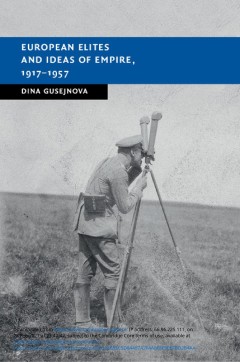
European elites and ideas of empire, 1917-1957
Who thought of Europe as a community before its economic integration in 1957? Dina Gusejnova illustrates how a supranational European mentality was forged from depleted imperial identities. In the revolutions of 1917 to 1920, the power of the Hohenzollern, Habsburg and Romanoff dynasties over their subjects expired. Even though Germany lost its credit as a world power twice in that century, in …
- Edition
- -
- ISBN/ISSN
- 9781316343050
- Collation
- xlviii, 344p. : ill.
- Series Title
- -
- Call Number
- 325.309409041 GUS e
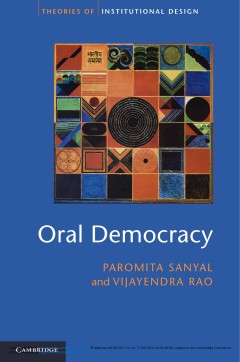
Oral democracy : deliberation in Indian village assemblies
Oral Democracy studies citizens' voices in civic and political deliberations in India's gram sabhas (village assemblies), the largest deliberative institution in human history. It analyses nearly three hundred transcripts of gram sabhas, sampled within the framework of a natural experiment, allowing the authors to study how state policy affects the quality of discourse, citizens' discursive per…
- Edition
- -
- ISBN/ISSN
- 9781139095716
- Collation
- xi, 215p. : ill.
- Series Title
- -
- Call Number
- 320.840954 SAN o
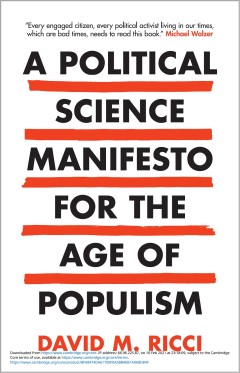
A political science manifesto for the age of populism : challenging growth, m…
Populism and authoritarian-populist parties have surged in the 21st century. In the United States, Donald Trump appears to have become the poster president for the surge. David M. Ricci, in this call to arms, thinks Trump is symptomatic of the changes that have caused a crisis among Americans - namely, mass economic and creative destruction: automation, outsourcing, deindustrialization, globali…
- Edition
- -
- ISBN/ISSN
- 9781108785440
- Collation
- x, 245p. : ill.
- Series Title
- -
- Call Number
- 320.473 RIC p
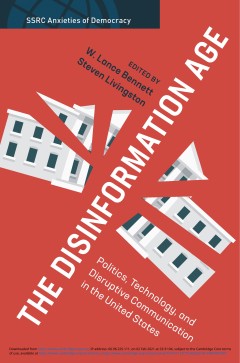
The disinformation age : politics, technology, and disruptive communication i…
The intentional spread of falsehoods – and attendant attacks on minorities, press freedoms, and the rule of law – challenge the basic norms and values upon which institutional legitimacy and political stability depend. How did we get here? The Disinformation Age assembles a remarkable group of historians, political scientists, and communication scholars to examine the historical and politic…
- Edition
- -
- ISBN/ISSN
- 9781108914628
- Collation
- xxvii, 293p. : ill.
- Series Title
- -
- Call Number
- 320.973014 DIS d
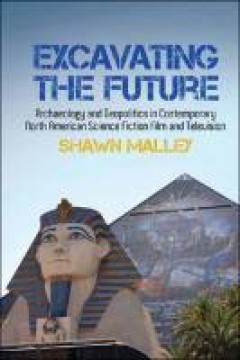
Excavating the future : archaeology and geopolitics in contemporary North Ame…
Well-known in science fiction for tomb-raiding and mummy-wrangling, the archaeologist has been a rich source for imagining ‘strange new worlds’ from ‘strange old worlds.’ But more than a well-spring for SF scenarios, the genre’s archaeological imaginary invites us to consider the ideological implications of digging up the past buried in the future. A cultural study of an array of very…
- Edition
- -
- ISBN/ISSN
- 9781786948731
- Collation
- XV, 228 p.
- Series Title
- -
- Call Number
- 791.43615097 MAL e

The cinema of Oliver Stone: art, authorship and activism
This book charts and analyses the work of Oliver Stone – arguably one of the foremost political filmmakers in Hollywood during the last thirty years. Drawing on previously unseen production files from Oliver Stone’s personal archives and hours of interviews both with Stone and a range of present and former associates within the industry, the book employs a thematic structure to explore Ston…
- Edition
- -
- ISBN/ISSN
- 9780719099168
- Collation
- viii, 304 pages : ill ; 23 cm
- Series Title
- -
- Call Number
- 791.430233092 CIN c
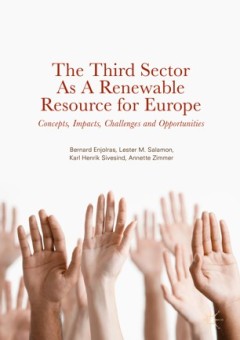
The third sector as a renewable resource for Europe : concepts, impacts, chal…
This book provides a critical account of the third sector and its future in Europe. It offers an original conceptualization of the third sector in its European manifestations alongside an overview of its major contours, including its structure, sources of support, and recent trends. It also assesses the impact of this sector in Europe which considers its contributions to European economic devel…
- Edition
- -
- ISBN/ISSN
- 9783319714738
- Collation
- xv, 196 p.
- Series Title
- -
- Call Number
- 361.61 ENJ t
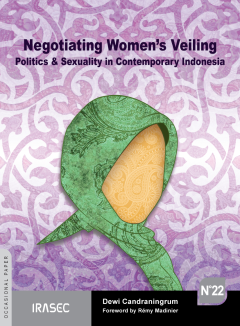
Negotiating women’s veiling : politics & sexuality in contemporary Indonesia
This study will focus on the Indonesian jilbab, an ubiquitous piece of cloth that covers the hair and neck of women tightly, leaving no skin unconcealed. Achievement and role of jilbab after the authoritarian regime of Soeharto in 1998 is hardly known. The author examines women perception but also the Sharia Ordinances and the narratives of censorship. Voices of both women and sexual minorities…
- Edition
- -
- ISBN/ISSN
- 9782355960109
- Collation
- -
- Series Title
- -
- Call Number
- 340 CAN n
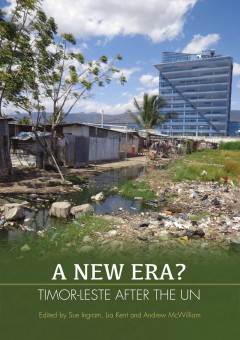
A new era? : Timor-Leste after the UN
Timor-Leste has made impressive progress since its historic achievement of independence in 2002. From the instability that blighted its early years, the fledgling democratic country has achieved strong economic growth and a gradual reinstatement of essential social services. A decade on in 2012, Presidential and Parliamentary elections produced smooth political transitions and the extended UN p…
- Edition
- -
- ISBN/ISSN
- 9781925022513
- Collation
- xv, 263p. : ill.
- Series Title
- -
- Call Number
- 959.8704 ANE a

Authoritarian modernization in Indonesia’s early independence period : the …
In Authoritarian Modernization in Indonesia’s Early Independence Period, Farabi Fakih offers a historical analysis of the foundational years leading to Indonesia’s New Order state (1966–1998) during the early independence period. The study looks into the structural and ideological state formation during the so-called Liberal Democracy (1950–1957) and Sukarno’s Guided Democracy (1957�…
- Edition
- -
- ISBN/ISSN
- 9789004437722
- Collation
- XVIII, 295 p.
- Series Title
- -
- Call Number
- 959.8035 FAK a
 Computer Science, Information & General Works
Computer Science, Information & General Works  Philosophy & Psychology
Philosophy & Psychology  Religion
Religion  Social Sciences
Social Sciences  Language
Language  Pure Science
Pure Science  Applied Sciences
Applied Sciences  Art & Recreation
Art & Recreation  Literature
Literature  History & Geography
History & Geography